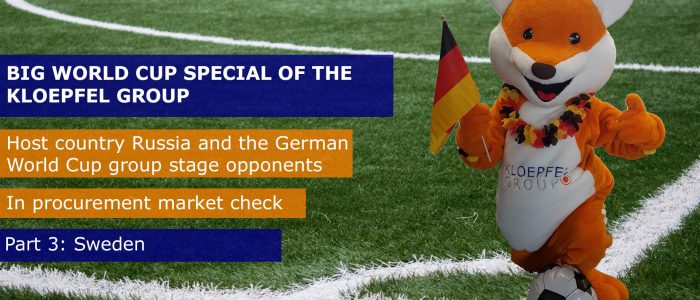Procurement market Sweden – How strong is our preliminary round opponent?
The preliminary round of the World Cup is in full swing. For this major sporting event, the Kloepfel Group is taking a closer look at the procurement market from Germany’s preliminary rounds opponents and the host country Russia. Learn more about what makes up the procurement market of our group opponent Sweden, what needs to be considered and which markets are particularly interesting, in the third part of our World Cup special.
Procurement in the far north
The country in the far north has a lot more to offer than just its numerous forests and lakes. At the end of the 19th century, Sweden was still one of the poorest countries in Europe. The construction of the railway, however, made it possible to develop raw material deposits in the north of the country, which led to enormous economic growth. Within half a century, the country became one of the richest countries in the world.
The Swedish domestic market is relatively small, which is why companies have been orienting themselves towards other markets for a long time and therefore want to achieve growth primarily through the export of goods. The most important export destinations include Germany (12.1 billion euros), Norway (11.9 billion euros), the USA (8.3 billion euros), Denmark (8.2 billion euros) and Finland (7.9 billion euros).
In terms of population, Sweden has a high proportion of large multinational companies and internationally operating brands. Among the most successful international companies are Volvo, Ericsson, SCA, Vattenfall, Skanska, H&M, TeliaSonera, Electrolux, IKEA, AstraZeneca and Tetra Pak.
Numerous raw material deposits and a high level of technical development
Today, Sweden is Northern Europe’s largest national economy. The most important industrial regions are located in the Öresund region of southern Sweden, the border region between Sweden and Denmark. Moreover, the Swedish capital Stockholm is also regarded as Scandinavia’s most important financial center. Important branches of industry include chemicals and pharmaceuticals, mechanical engineering, automotive industry, paper, energy industry and medical technology. Enormously high raw material resources such as wood, hydropower and various ores promote these energy-intensive industries in particular.
Sweden is one of the leading countries in research and development and has a high level of technical development. Sweden’s most important industries of the future are information and communication technology, biotechnology and environmental technology. In addition, there are the creative industries of Design, Fashion and Music.
Economic and social structures
Swedish economic growth is above the EU average. The private sector alone is responsible for the economic growth. Interest rates and inflation are low. Through the weak public financial conditions drastic cuts in government spending had to be made. Sweden’s successful model is characterized by a social policy, a clear commitment to the welfare state and security for all social classes. The GDP of Sweden in 2017 amounted to 460,115 Swedish krona (about 45,121 euros). While traditional agriculture still generates 2 percent of GDP, the service sector accounts for about 70 percent.
Last year, about 5,022,000 people aged 15 to 74 worked. This is an increase of 112,000 employees compared to the previous year. The number of unemployed was 358,000, which equates to an unemployment rate of 6.7 percent. 99,000 of them are considered long-term unemployed and the number of unemployed young people is falling. While the figure was 17.8 percent in 2017, it was 1.1 percentage points more in the previous year. An increase in the employment rate was recorded particularly among foreign workers. The Swedish labor market had around 1,136,000 foreign workers available, of which 965,000 were employed.
Like the majority of Western European countries, Sweden also has a high immigration number of war refugees. The state gradually integrates these into the world of work.
Unproblematic free trade
Since 1995 Sweden has not had its own free trade agreement. As a member of the European Union, Sweden is subject to the same free trade agreements as all other members. The EU already has free trade agreements with a large number of countries and is negotiating further agreements, for example with the United States.
As part of the European Union, Sweden is also part of its customs territory, which is why no customs documents are required for trade between Sweden and other EU countries.
Distinct logistics infrastructure
The central location in Northern Europe and the intensive foreign trade links encourage the nationwide settlement of logistics centers. A total of around 224,000 people are employed in the approximately 30,000 logistics companies. Every year, about 500 million tons of goods are transported by road, rail and waterway.
Thereby, the focus of logistics activities is on the south of the country. About one third of Sweden’s foreign trade is conducted in Gothenburg alone. But mining in northern Sweden is also very important for the infrastructure. The logistics in Sweden is mainly dominated by foreign logistics service providers such as Schenker or DHL.
Tolls are only payable in Sweden when crossing the Öresund and Svinesund bridges, as well as in the city centers of Stockholm and Gothenburg. However, this currently only applies to vehicles registered in Sweden.
Conclusion
The Swedish procurement market holds a lot of potential and is quite attractive for European companies. Although it is currently still relatively small at present, membership of the European Union means that there are no obstacles with procurement from Sweden. Whether the Swedish national team will do as well at the World Cup as its procurement market remains to be seen.
About the author
Osman Cetinkaya – Senior Partner
At Kloepfel Consulting, Osman Cetinkaya is responsible for projects in the trade and services sector. He is also responsible for human resources at Kloepfel Consulting.
Would you also like to benefit from the know-how of our experts? Then feel free to contact us at +49 211 875 453 23 or at info@kloepfel-consulting.com.
Part 1: Procurement market Russia – The host country of the World Cup in the check
Part 2: Procurement Market Mexico – More than just Siesta!
Part 4: Procurement market South Korea – The opponent of the World Cup in the check
Part 5: Procurement market Switzerland – Our neighboring country in check
Part 6: Procurement market Brazil: Is everything sweet in the land of the Sugarloaf Mountain?



Comments are closed.